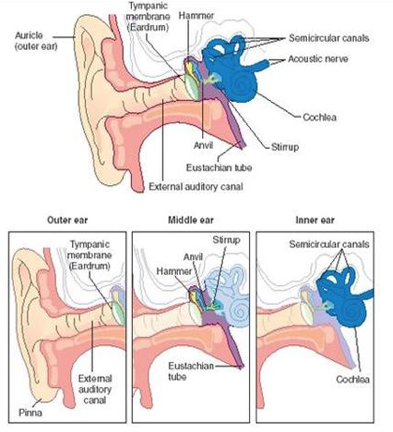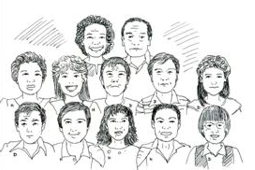
Introduction
Hearing Loss makes people been isolated as they cannot understand what other people say and always miss interpreted. They also may involve with accident or losing their job. Three Main Types of hearing loss :
- Conductive
- Caused by a problem in the outer ear or middle ear.
- Usually affect all frequencies to the same degree and not severe
- Sensorineural
- Caused by a problem in the inner ear or auditory nerve
- Sounds may be appear distorted even with the use of hearing aid.
- Mixed
- A combination of conductive and sensorineural losses
Deafness is also can label as mild, moderate, severe and profound hearing loss. Profound hearing loss sometimes used as a term to describe deafness.
Causes
What causes deafness?

- Family history
- Fluid in the middle ear cavity
- Low birthweight (< 1.5 kg)
- Severe lack of oxygen supply to the brain at birth
- Infection such as congenital rubella or congenital syphilis
- Infection of the brain lining (meningitis)
- Drugs which are toxic to the ear eg. Drugs for Tuberculosis and Cancer
- Exposure to excessive loud noise e.g. firecrackers, loud concerts/working with noisy certain metals or solvents environment
- Impacted wax in the ear
- Perforated ear drum
- Infection of the middle ear (Otitis Media)
- Chronic Metabolic Diseases (Diabetes and high cholesterol)
- Old age
Classification of Hearing Loss
Degree of Severity according to WHO :
|
Category of deafness
|
Degree of loss (Decibel)
|
Effect on hearing
|
|---|---|---|
| Mild |
25 – 40
|
Difficulty in hearing in a noisy environment |
| Moderate |
41 – 60
|
Inability to hear whisper |
| Severe |
61 – 80
|
Inability to understand soft, moderate and loud speech |
| Profound |
>81
|
Unable to understand even very loud speech |
Classification of Hearing Loss
National Burden of Disease and Injury Study 2001 showed that deafness is the second commonest cause of non fatal condition. (Commonest causes in order : unipolar depression, diabetes and osteoarthritis) Survey in 2006 by Instutute of Public Health on hearing loss and ear disease showed that prevalence of hearing loss (i.e. loss of hearing in any of the frequencies tested) in Malaysia is 21.57% or one fifth of the population. Hearing loss increases with increase in age. Hearing loss by age group is as follows :
- 63% of persons above 56 years
- 16.1% of persons aged 18 – 55 years (working population)
- 3.5% of children aged 13 – 17 years (secondary school)
- 6.6% of children aged 7 – 12 years (primary school)
- 6.6% of children aged 3 – 6 years (pre school)
Prevalence of deafness (moderate and severe) that requires assistive device i.e. hearing aids is 3.83%
Signs and symptoms
What are the signs & symptoms?
- Children:
- No/ Responding to only loud sounds
- Delay or failure to acquire speech
- Adults
- Asking people to repeat
- Difficulty in hearing in a noisy environment or group
- Turning up the volume of the television
- Having difficulty in communicating with family members and friends
- Hearing noise in the ear (tinitus)
- Difficulty in hearing telephone ringing
Complications
What are the effects of deafness?
- Communication difficulty
- Education problem
- Emotional disturbance
- Difficulty in social relationship
- Low esteem
- Sense of isolation, frustration and loss of confidence
Screening for hearing loss
How to detect early hearing loss?
- It is possible to measure hearing in babies as early as before one month of age.
- Hearing assessment should be done when any of the listed causes above is present or whenever hearing loss is suspected.
Treatment and management
The management of hearing loss depends on the type e.g:
- Conductive hearing loss. Most conductive hearing loss can be treated using medical or surgical treatment
- Impacted wax – removal of wax
- Infection of the middle ear – medication and sometimes or surgery
- Otosclerosis – ear surgery
- Hearing aids once medical/surgical treatment is complete and to improve the patient’s residual hearing
- Sensorineural hearing loss. Most sensorineural hearing loss is permanent and cannot be cured by medical or surgical treatment. Management of sensorineural hearing loss include <
- Hearing amplification
- Through usage of properly fitted hearing aids.
- Cochlear implant may be indicated to those with severe hearing loss and after a trial aid but not benefiting from hearing aids.
- Training in communication strategies
- Listening skills
- Communication/ repair skills
- Children with congenital/ early onset hearing loss should be enrolled into early intervention programme as soon as early as possible to facilitate their language and cognitive development. Various communication options are available in this country
- Oral communication
- Cued speech
- Sign language
- Hearing amplification

Rehabilitation
When to start rehabilitation?
- Early intervention should begin once child is detected to have impaired hearing as early as 6 months of age.
- Inform parents information and education on normal hearing, speech and language development.
- Refer for early intervention programme with:
- Ear Nose andThroat Specialist, Speech Pathologist, Audiolgist in hospital
- Health centre
- Community Based Rehabilitation Centre by National Unity and Social Development
- NGOs – YMCA Pusat Majudiri for the deaf
- Integrated School by the Education Department
- School for the Deaf by the Education Department
Where to get hearing aids?
- Get advice from Audiologist.
How to register?
- Once the diagnosis is confirmed, get the “Borang Pendaftaran dan Cadangan Penempatan” from Health Centre, State Social Welfare and Education Department.
Who will assist in the registration?
- Attending Doctor will fill the relevant forms.
What benefits you will get on registration?
How to find job placement?
- Ministry of Human Resource
- NGOs
Prevention
How to prevent?
50 % of cases of hearing loss can be prevented. Some ways of preventing hearing loss are as follows”
- Girls are advice to get Rubella injection especially before marriage
- Take Haemophilus Influenza Injection.
- Pregnant mothers should avoid ototoxic drugs.
- Wear hearing protectors e.g. ear muffs, ear plugs during work and recreation noise and noisy environment
- Keep away from noisy environment.
- Limit the exposure time to noise such as a loud music.
- Get ear examinations and hearing checks regularly.
Support groups
Where to find support groups?
YMCA – Pusat Majudiri for the deaf
http://www.ymcakl.com/pmy/PMY_deafwork.htm
Address: 95, Jln. Padang Belia, 50470 Kuala Lumpur, Malaysia
Tel: 603-22741439
Fax:603-22740559
Sabah Society for the Deaf
http://www.sabah.org.my/kkssdeaf/
Malaysian Federation of the Deaf
http://www.mfd.org.my/
Pusat Pertuturan Kiu, Kg Pandan (They use cued speech.)
Pusat TUTUR
Klinik Audiologi and Sains Pertuturan Fakulti Sains Kesihatan Bersekutu UKM. (They use oral approach.)
References
http://health.yahoo.com/centers/hearing_loss/1
http://deafness.about.com/od/employmentandworking
http://kidshealth.org./kid/health_problems/sight/hearing_impairment.html
http://deafness.about.com/od/basicsofcochlearimplants/
| Last Reviewed | : | 20 June 2014 |
| Writer | : | Cheoh Siew Tin |
| Accreditor | : | Dr. Aminah Bee Kassim Prof Dr. Siti Zamratol |
| Reviewer | : | Dr. Hj. Abd. Razak Hj. Ahmad |







